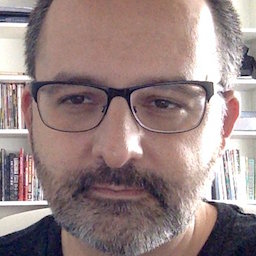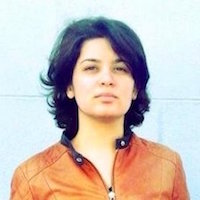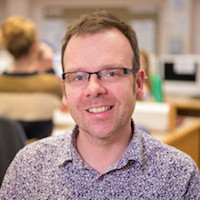European Data and Computational Journalism Conference
June 20th - 21st 2018 - Cardiff, Wales
The Conference
The 2nd European Data and Computational Journalism Conference aims to bring together industry, practitioners and academics in the fields of journalism and news production and information, data, social and computer sciences, facilitating a multidisciplinary discussion on these topics in order to advance research and practice in the broad area of Data and Computational Journalism.
Held in Cardiff, Wales, the conference presented a mix of academic talks and keynotes from industry leaders. It was be followed by a day of workshops and tutorials.
This was the 2nd edition of the European Data and Computational Journalism Conference. The 1st edition was held in 2017 in Dublin, Ireland
Speakers

Alberto Cairo
University of Miami
Data Visualisation for Everyone
The use of graphs, charts, maps, and infographics to explore data and communicate science to the public has become more and more popular among scientists and journalists alike. However, this rise in popularity has not been accompanied by an increasing awareness of the principles and rules that should guide the design of these visualizations.
With facts and truth increasingly under assault, many interest groups have enlisted data visualization to support all manner of spin. Because digital images and graphics are inherently sharable and can quickly amplify messages, sifting through the visual information and misinformation is more critical than ever, and creating effective data visualizations without misleading viewers is an important skill for journalists — one that is within your reach, regardless of your background or budget.

Mar Cabra
Previously at ICIJ
Our Democracy Depends on How we Archive and Share Data
Data is getting to journalists at a massive scale due to electronic leaks. Recent examples are the Panama and the Paradise Papers, which amounted to four terabytes and 25 million files made available securely in the cloud to hundreds of reporters using open-source software. These exposés had unprecedented impact with high-level resignations and opened more than 150 investigations in 79 countries.
The value of leaks like these doesn’t finish when the investigations are published. Connecting the dots between collections of leaked or public documents and data will become increasingly more important, so the conversation about how to archive and share them is crucial. If we don’t have it, our democracy will be in danger.
Conference Schedule
Below is the conference schedule
Day 1 - Wednesday 20th June 2018
Glamorgan Building, Cardiff University
| Time | Talk |
|---|---|
| 9:30 | Arrival and Registration |
| 10:00 | Opening |
| 10:15 | Invited Talk Alberto Cairo, University of Miami |
| 11:00 | The stories behind a line: visualising personal narratives Federica Fragapane |
| 11:20 | Break |
| 11:40 | Data-driven journalism and transparency in Brazil: collaboration for open data Marília Gehrke |
| 12:00 | Fragmentation across media platforms: Mapping Audience behaviour on the web, Facebook and Twitter Silvia Majo-Vazquez, Jason R. C. Nurse, Jun Zhao and Rasmus K Nielsen |
| 12:20 | 10 top tips for making government data more accessible Zoe Hartland |
| 12:40 | datastorytelling.gov.uk Lisa Jones |
| 13:00 | Lunch |
| 14:00 | How the BBC is enhancing local news output through its new Shared Data Unit Peter Sherlock |
| 14:20 | Data Journalism Education Globally Bahareh R. Heravi |
| 14:40 | You guessed it! Reflecting on preconceptions and exploring data without statistics Pablo Leon Villagra, Sarwar Islam, Megan Lucero, Brooks Paige and Tomas Petricek |
| 15:00 | Break |
| 15:20 | Stories of storytelling about UK’s EU funding Mariana Marasoiu, Sarwar Islam, Luke Church, Megan Lucero, Brooks Paige and Tomas Petricek |
| 15:40 | Fighting corruption using open data with Global Witness and DataKind Giselle Cory |
| 16:00 | Invited Talk Mar Cabra |
| 16:45 - 17:00 | Closing |
Conference Social
The conference will be followed by a social gathering (details tbc) - please come along and join us for drinks and discussion!Day 2 - Thursday June 21st 2018
Glamorgan Building, Cardiff University
Our second day will consist of a number of hands on talks and workshops. Registered attendees will shortly receive an invite to register for their chosen workshops
| Time | Track 1: Workflow | Track 2: Coding | Track 3: Tools |
|---|---|---|---|
| 9:30 - 10:45 | From interactive to social media: how to promote data journalism Martin Gonzalez Gomez and Marie Segger, The Economist |
From Excel to R - part 1 Steph Locke, Locke Data |
How to create charts that won't upset data vis experts? The Do's and the Don'ts Lisa Charlotte Rost, Datawrapper |
| 10:45 - 11:15 | Break | ||
| 11:15 - 12:30 | From Excel to R - part 2 Steph Locke, Locke Data |
Google News Initiative: Tools for Data Journalism Vincent Ryan, Teaching Fellow, Google News Lab | |
| 12:30 - 13:30 | Lunch | ||
| 13:30 - 14:45 | Statistical Thinking for Journalists: from biases to objectivity - part 1 Ana Kolar, TaraStats Statistical Consultancy |
Introduction to Visualisation with JavaScript & D3 - part 1 Martin Chorley, Cardiff University |
Getting started with Data Journalism - part 1 Bahareh Heravi, University College Dublin and Glyn Mottershead, Cardiff University |
| 14:45 - 15:15 | Break | ||
| 15:15 - 16:30 | Statistical Thinking for Journalists: from biases to objectivity - part 2 Ana Kolar, TaraStats Statistical Consultancy |
Introduction to Visualisation with JavaScript & D3 - part 2 Martin Chorley, Cardiff University |
Getting started with Data Journalism - part 2 Bahareh Heravi, University College Dublin and Glyn Mottershead, Cardiff University |
Venue
The conference will be held at Cardiff University, Cardiff, Wales.
Days 1 & 2 will take place in the Glamorgan Building, on Cardiff University's Cathays campus, located next to the city centre and within easy walking distance of both rail and coach stations.
Glamorgan Building, Prince Edward VII Avenue, Cardiff, CF10 3WT
Cardiff University is well connected by public transport, road, rail and air. Our visit us page contains detailed information on how to get to Cardiff and to the University campus.
The Glamorgan building is a short walk from Cardiff Central station.
There is on street parking in the area around the Glamorgan Building, but this can be very busy during working hours.
Hotels
Cardiff offers a wide range of hotels that are within a short walk of the University campus.
Organisers

Bahareh Heravi
@Bahareh360
Bahareh is an Assistant Professor in the School of Information and Communication Studies at University College Dublin, where she is the the Postgraduate Director of the School, and the Director of the Data Journalism programme. Prior to joining UCD, Bahareh was the Head of Insight News Lab at the Insight Centre for Data Analytics at the National University of Ireland, Galway. During this time she led a number of R&D projects with the Irish National TV and Radio broadcaster, RTÉ. Bahareh is the former Lead Data Scientist at The Irish Times and the founder of Hacks/Hackers Dublin.

Glyn Mottershead
@glynmottershead
A former newspaper reporter, feature writer, subeditor and production journalist, Glyn has worked across a range of news beats including crime, health and local government. Glyn is a co-author of The 21st Century Journalism Handbook and specialises in Digital Journalism and Data Journalism. He is a member of Investigative Reporters and Editors, and the Online News Association. Glyn is the co-director of the MSc Computational and Data Journalism at Cardiff University. He teaches at undergraduate and postgraduate levels, specialising in digital and data journalism. He is one of the founders of Hacks/Hackers South Wales X South West.

Martin Chorley
@martinjc
Martin is a lecturer in the School of Computer Science & Informatics at Cardiff University, where he is course director for the MSc Computational and Data Journalism, chair of Postgraduate operations, and Deputy Director of Learning and Teaching. His research is primarily focused in the areas of computational journalism and mobile and social computing, where he examines the ways in which humans and society interact with systems and technology. He teaches web development, data analysis and visualisation. He is one of the organisers of the PyDiff meetup in Cardiff, and is also one of the founders of Hacks/Hackers South Wales X South West.
Program Committee
- James Hamilton (Stanford University, U.S.)
- Nicholas Diakopoulos (Northwestern University, U.S.)
- Meredith Broussard (New York University, U.S.)
- Cheryl Phillips (Stanford University, U.S.)
- Eddy Borges Rey (University of Stirling, Scotland, U.K.)
- Paul Bradshaw (Birmingham City University, U.K.)
- Marc Esteve del Valle (University of Groningen, The Netherlands)
- Jonathan Gray (Kings College London, U.K.)
- Stefano Ceccon (Data Science lead and Data Journalist, UK)
- Florian Stalph (University of Passau, Germany)
- Silvia Majo-Vazquez (University of Oxford, UK)
- Liliana Bounegru (University of Groningen, The Netherlands)
- Carl-Gustav Linden (University of Helsinki, Finland)
- Wiebke Loosen (Hans-Bredow-Institut, Germany)
- Ester Applegren (Södertörn University, Sweden)
- Bahareh Heravi (University College Dublin, Ireland)
- Glyn Mottershead (Cardiff University, Wales, U.K.)
- Martin Chorley (Cardiff University, Wales, U.K.)
Sponsors
Sponsorship opportunities are available, please get in touch! Please email us, contact one of the organisers directly, or get in touch via twitter.
Powered By

Supported by





